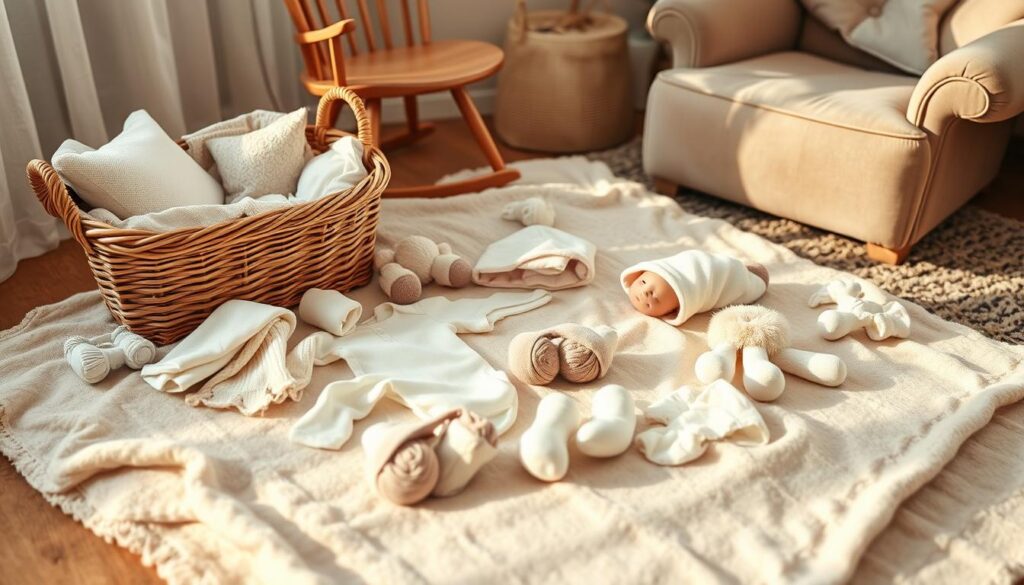Caring for Your Newborn Baby Boy: Welcoming a newborn baby boy into your family is a joyous occasion, but it can also be overwhelming. As you navigate the challenges of parenthood, you’ll want to ensure you’re giving your baby the best possible start in life.
Our expert guidance will help you care for your baby boy’s health and well-being. You’ll learn essential tips on maintaining hygiene, monitoring health, and fostering a nurturing environment.
By following our expert advice, you’ll be better equipped to handle the responsibilities of caring for your newborn baby boy. This will allow you to cherish the precious moments and create a strong bond with your child.
Contents
- 1 Welcoming Your Baby Boy Home
- 2 Essential Feeding Guidelines
- 3 Diapering and Hygiene for Baby Boys
- 4 Sleep Patterns and Creating Routines
- 5 Health Concerns and When to Call the Doctor
- 6 Expert Advice for New Parents of a Baby Boy
- 7 Conclusion: Caring for Your Newborn Baby Boy
- 8 FAQ
- 8.1 How often should I bathe my newborn baby boy?
- 8.2 What are the best ways to prevent diaper rash?
- 8.3 How can I ensure my baby is latching correctly during breastfeeding?
- 8.4 What are the signs of jaundice in newborns, and what should I do if I notice them?
- 8.5 How can I reduce the risk of SIDS in my baby boy?
- 8.6 What are the essential items I need to prepare for my baby boy’s arrival?
Welcoming Your Baby Boy Home
Bringing your newborn baby boy home is a big step. It needs careful planning. You want to make sure your home is safe and welcoming for your baby and you.
Creating a Supportive Environment
Getting your home ready for your baby boy is more than just decorating. It means securing any heavy furniture or appliances to stop them from tipping over. Also, make sure all electrical outlets are covered.
- Secure heavy furniture and appliances to walls
- Cover electrical outlets with safety caps
- Remove any hazardous materials or objects from reach
Managing visitors is key to getting enough rest. It’s nice to have friends and family around, but too many can be too much. Think about setting visiting hours or limiting the number of guests at a time.
| Visitor Management Tips | Benefits |
|---|---|
| Set specific visiting hours | Reduces overwhelem |
| Limit the number of visitors | Conserves energy |
| Ask visitors to help with chores | Lightens your load |
Essential Safety Measures
It’s important to take safety steps to avoid accidents. This includes putting up safety gates at stairs, using a baby monitor, and never leaving your baby alone.
- Install safety gates at the top and bottom of stairs
- Use a baby monitor to keep an eye on your baby
- Never leave your baby unattended
Essential Feeding Guidelines
Feeding your newborn is crucial for their health. Knowing the basics is key, whether you’re breastfeeding or formula-feeding. This knowledge helps you face any challenges.
Latching Techniques
For breastfeeding moms, learning latching techniques is vital. Make sure your baby’s mouth covers the areola, not just the nipple. This prevents discomfort and ensures effective feeding.
Newborns usually eat 8-12 times in 24 hours. Watch for your baby’s cues to figure out their feeding schedule. This can change.
Choosing the Right Formula
If you’re not breastfeeding, picking the right formula is key. Think about your baby’s age, dietary needs, and any allergies when choosing.
| Formula Type | Description | Suitable For |
|---|---|---|
| Cow’s Milk-Based | Most common type, mimics breast milk composition | Babies with no dairy allergy |
| Soy-Based | For babies with cow’s milk allergy or intolerance | Babies with dairy issues |
| Hypolactogenic | Designed for babies with sensitive stomachs | Babies with digestive issues |
Proper Bottle Preparation
When preparing bottles, follow the manufacturer’s mixing instructions. This ensures the right formula concentration. Always use clean gear and store prepared formula in the fridge to avoid bacterial growth.
- Wash your hands before preparing bottles.
- Use sterilized equipment for mixing.
- Store prepared formula in the refrigerator.
By following these essential feeding guidelines, you’ll be ready to give your newborn baby boy the nutrition he needs for growth and development.
Diapering and Hygiene for Baby Boys
Keeping your baby boy clean is key for his health. It helps avoid skin problems and infections.
Preventing Diaper Rash
Diaper rash is common in newborns. Change diapers often, especially after they poop. Use soft, fragrance-free wipes and a barrier cream each time.
Uncircumcised Care
For uncircumcised boys, clean the area with warm water during baths. Don’t pull back the foreskin to avoid irritation.
If your baby is circumcised, follow your doctor’s care tips. This usually means applying petroleum jelly and keeping it clean.
Bath Time Essentials
Bath time is a special bonding moment. Use warm water and fragrance-free soap. Always support your baby’s head and neck.
| Hygiene Practice | Frequency | Tips |
|---|---|---|
| Diaper Changes | Every 2-3 hours | Use gentle wipes, apply barrier cream |
| Bath Time | 2-3 times a week | Use warm water, gentle soap, support head and neck |
Sleep Patterns and Creating Routines
As a new parent, knowing your baby boy’s sleep patterns is key. Setting up a sleep routine is crucial for his growth and your rest. Newborns sleep in cycles, lasting 20-40 minutes, with brief wake-ups in between.
Reducing SIDS Risk
To lower Sudden Infant Death Syndrome (SIDS) risk, make sure your baby sleeps on a firm mattress. Also, keep the crib clear of soft toys, blankets, and pillows.
Swaddling Techniques
Swaddling makes your baby feel safe and cozy. Use a light blanket for swaddling. Make sure your baby’s face is free and their hips aren’t too tight.
| Tip | Description |
|---|---|
| Establish a bedtime routine | Develop a calming pre-sleep routine, such as a warm bath or reading |
| Create a sleep-friendly environment | Keep the room dark, quiet, and at a comfortable temperature |
| Watch for sleepy cues | Pay attention to your baby’s sleep signals, such as yawning or rubbing their eyes |
By following these tips and understanding your baby boy’s sleep patterns, you can create a sleep routine that works for your family. This promotes healthy sleep habits.
Health Concerns and When to Call the Doctor
Your newborn baby boy’s health is very important. Knowing about health issues can make the early days easier. It’s key for new parents to understand common health problems that can affect their baby.
Newborns face many health concerns, which can worry new parents. Knowing about these issues helps you spot symptoms and get medical help when needed.
Jaundice and Skin Conditions
Jaundice is common in newborns, making their skin and eyes yellow. It’s often due to high bilirubin levels. If your baby’s skin turns yellow, talk to your pediatrician. Other skin issues, like rashes or eczema, can also happen. Keep an eye on your baby’s skin and tell your doctor about any unusual changes.
It’s crucial to take care of your baby’s umbilical cord to avoid infections. Make sure it stays dry and avoid water until it falls off. Look out for signs of infection like redness, swelling, or discharge. If you see these, call your pediatrician.
Fever and Illness Symptoms
Fever in newborns is something to worry about. If your baby is under 3 months and has a fever over 100.4°F (38°C), get medical help right away. Also, watch for signs like lethargy, poor feeding, or trouble breathing. These are reasons to call your doctor.
- Keep an eye on your baby’s temperature.
- Watch for signs of illness, such as changes in feeding or breathing patterns.
- Don’t hesitate to contact your pediatrician if you’re concerned about your baby’s health.
Expert Advice for New Parents of a Baby Boy
Starting out with a baby can feel overwhelming. But, with the right advice, you’ll be ready to care for your newborn baby boy. It’s key to have the right clothes and gear for your baby’s comfort and safety.
Clothing and Gear Recommendations
For baby boy clothing, choose soft, breathable fabrics like cotton. Onesies and sleepers are great for the first few months. They make diaper changes and bedtime easier.
For newborn gear, you’ll need the basics: a crib or bassinet, a changing table, and a baby monitor. These help create a safe, comfy space for your baby boy.
Must-Have Items for the First Months
- Diapers and wipes for regular changes
- Baby blankets for warmth and comfort
- Baby carriers or slings for hands-free parenting
- Bath time essentials like a baby bathtub and soft towels
Having these must-have items for newborns makes caring for your baby boy easier. It’s not about having lots of gear. It’s about having the right gear for your baby’s needs.

Conclusion: Caring for Your Newborn Baby Boy
As you navigate the journey of parenting, remember that embracing parenthood is a process that takes time. You’ve learned essential guidelines for feeding, diapering, and creating routines for your newborn baby boy. Now, it’s crucial to be kind to yourself and cherish the moments, even in the challenging times.
You’re not alone in this journey; don’t hesitate to ask for help when needed. The advice from experts and your own instincts will guide you as you care for your baby boy.
By embracing the journey of parenting with an open heart and mind, you’ll enjoy the precious moments with your newborn.
See Also: Morning Routine for 10 Year Olds: 10 Practical Tips
FAQ
How often should I bathe my newborn baby boy?
Bathe your newborn baby boy 2-3 times a week. This helps keep his skin healthy. You can also use sponge baths until the umbilical cord falls off. [Caring for Your Newborn Baby Boy]
What are the best ways to prevent diaper rash?
To avoid diaper rash, change diapers often and use a diaper cream. Give your baby time without a diaper to breathe. Use breathable diapers and wipes too. [Caring for Your Newborn Baby Boy]
How can I ensure my baby is latching correctly during breastfeeding?
Make sure your baby’s mouth covers the areola, not just the nipple. Try different latching techniques. If needed, get help from a lactation consultant. [Caring for Your Newborn Baby Boy]
What are the signs of jaundice in newborns, and what should I do if I notice them?
Jaundice makes the skin and eyes yellow. If you see this, talk to your pediatrician. It could mean your baby needs medical help. [Caring for Your Newborn Baby Boy]
How can I reduce the risk of SIDS in my baby boy?
Place your baby on his back to sleep. Use a firm mattress and keep the crib simple. Consider a sleep sack or swaddle for safe sleep. [Caring for Your Newborn Baby Boy]
What are the essential items I need to prepare for my baby boy’s arrival?
You’ll need diapers, onesies, a crib, and a changing table. A breast pump and baby monitor are also key. Make a checklist to be sure you’re ready. [Caring for Your Newborn Baby Boy]

Hi, I’m Waverly Moon, creator of TipsToFeelBetter.com. This blog is for practical moms and family-focused women seeking simple, realistic ways to improve daily life. From home routines to self-care, I share tips that truly work—because life doesn’t need to be perfect to feel better. Let’s make everyday moments a little easier, together.

